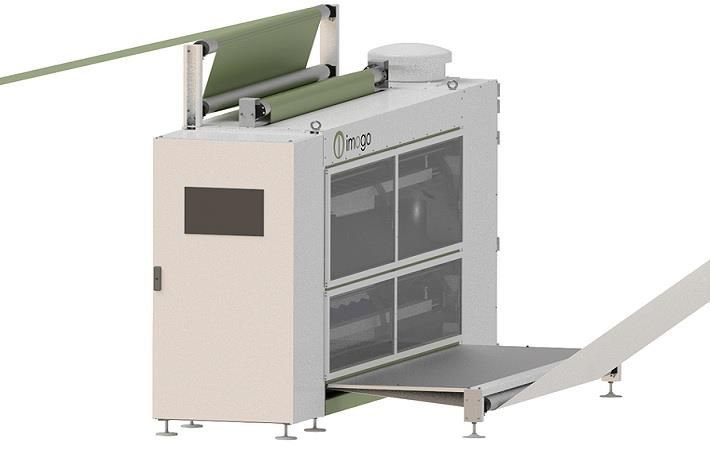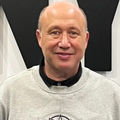Interviews
News Flash
Imogo develops Dye-Max spray dyeing technology
21 Nov '20
4 min read

Pic: Imogo
Imogo, the latest company to join TMAS - the Swedish Textile Machinery Association - has developed Dye-Max spray dyeing technology which reduces use of fresh water, wastewater, energy and chemicals by 90 per cent compared to conventional jet dyeing systems. The technology was discussed at a roundtable on spray application technologies at ITA 2020.
The roundtable `Sustainable Finishing Methods in Textile Finishing’ discussed the opportunities for new spray application technologies for the dyeing and finishing sector.
Dye-Max spray dyeing technology can slash the use of fresh water, wastewater, energy and chemicals by as much as 90 per cent compared to conventional jet dyeing systems. This is due to the extremely low liquor ratio of 0.3-0.8 litres per kilo of fabric and at the same time, considerably fewer auxiliary chemicals are required to start with.
Such technologies face a number of obstacles to adoption and during the ITA (Innovate Textiles and Apparel) discussion it was agreed that 2020 has not provided the ideal climate for adventurous investors.
“The textile industry is quite conservative and is definitely in survival mode at the moment and it is not the time to be a visionary,” said Imogo founding partner Per Stenflo. “Day to day business is about staying alive – that’s the reality for many of our customers.”
All the panellists agreed that sustainable production will remain on top of the agenda for the textile industry in the longer term and spray technologies for dyeing and finishing processes will be a part of it.
“Any investment in something new is a risk of course, and we have to be able to explain and convince manufacturers that there’s a good return on investment, not only in respect of sustainability, but in terms of making good business sense,” said Stenflo. “Here we could use the help of the brands of course, in putting pressure on their suppliers to be more sustainable. Governments also have a role to play, in providing incentives for producers to move in the sustainable direction. Sustainability alone will never cut it, there has to be a business case, or it won’t happen.”
The marketing of sustainable new fibres is comparatively easy for the brands compared to explaining the difficult textile processes and the chemistries involved in fabric and garment production, he added.
“These fibres, however, currently go through all the same dirty processes that we need to get away from, so it must happen,” he said. “In developing our technologies, it has been important for us to avoid disrupting existing supply chains, stick with using off-the-shelf chemistries and dyes, and involve the dye manufacturers who are an essential part in how operations are driven today.”
“In fact, collaboration across the entire textile supply chain – from the brands right back to the new technology developers – is essential in moving the sustainability agenda forward,” he said.
“We are also looking into new business models in terms of how to reduce or lower the thresholds for investment and minimise the risk for the manufacturers who are looking to be the innovators,” he concluded.
Also taking part in the ITA roundtable discussion were Simon Kew (Alchemie Technology, UK), Christian Schumacher (StepChange Innovations, Germany) Tobias Schurr (Weko, Germany), Rainer Tüxen (RotaSpray, Germany) and Felmke Zijilstra (DyeCoo, Netherlands).
“It’s fantastic that all of this innovation is taking place in Europe based on established know-how and forward thinking,” said TMAS secretary general Therese Premler-Andersson. “Spray application technologies are a perfect illustration of how new digital technologies can lead to more sustainable production, in this case by replacing water-intensive processes with the highly precise and controlled application of dyes and chemistries as vapour.”
The roundtable `Sustainable Finishing Methods in Textile Finishing’ discussed the opportunities for new spray application technologies for the dyeing and finishing sector.
Dye-Max spray dyeing technology can slash the use of fresh water, wastewater, energy and chemicals by as much as 90 per cent compared to conventional jet dyeing systems. This is due to the extremely low liquor ratio of 0.3-0.8 litres per kilo of fabric and at the same time, considerably fewer auxiliary chemicals are required to start with.
Such technologies face a number of obstacles to adoption and during the ITA (Innovate Textiles and Apparel) discussion it was agreed that 2020 has not provided the ideal climate for adventurous investors.
“The textile industry is quite conservative and is definitely in survival mode at the moment and it is not the time to be a visionary,” said Imogo founding partner Per Stenflo. “Day to day business is about staying alive – that’s the reality for many of our customers.”
All the panellists agreed that sustainable production will remain on top of the agenda for the textile industry in the longer term and spray technologies for dyeing and finishing processes will be a part of it.
“Any investment in something new is a risk of course, and we have to be able to explain and convince manufacturers that there’s a good return on investment, not only in respect of sustainability, but in terms of making good business sense,” said Stenflo. “Here we could use the help of the brands of course, in putting pressure on their suppliers to be more sustainable. Governments also have a role to play, in providing incentives for producers to move in the sustainable direction. Sustainability alone will never cut it, there has to be a business case, or it won’t happen.”
The marketing of sustainable new fibres is comparatively easy for the brands compared to explaining the difficult textile processes and the chemistries involved in fabric and garment production, he added.
“These fibres, however, currently go through all the same dirty processes that we need to get away from, so it must happen,” he said. “In developing our technologies, it has been important for us to avoid disrupting existing supply chains, stick with using off-the-shelf chemistries and dyes, and involve the dye manufacturers who are an essential part in how operations are driven today.”
“In fact, collaboration across the entire textile supply chain – from the brands right back to the new technology developers – is essential in moving the sustainability agenda forward,” he said.
“We are also looking into new business models in terms of how to reduce or lower the thresholds for investment and minimise the risk for the manufacturers who are looking to be the innovators,” he concluded.
Also taking part in the ITA roundtable discussion were Simon Kew (Alchemie Technology, UK), Christian Schumacher (StepChange Innovations, Germany) Tobias Schurr (Weko, Germany), Rainer Tüxen (RotaSpray, Germany) and Felmke Zijilstra (DyeCoo, Netherlands).
“It’s fantastic that all of this innovation is taking place in Europe based on established know-how and forward thinking,” said TMAS secretary general Therese Premler-Andersson. “Spray application technologies are a perfect illustration of how new digital technologies can lead to more sustainable production, in this case by replacing water-intensive processes with the highly precise and controlled application of dyes and chemistries as vapour.”
Fibre2Fashion News Desk (SV)
Popular News
Leave your Comments
Editor’s Pick
































-Ltd..jpg?tr=w-120,h-60,c-at_max,cm-pad_resize,bg-ffffff)





.jpg?tr=w-120,h-60,c-at_max,cm-pad_resize,bg-ffffff)
.jpg?tr=w-120,h-60,c-at_max,cm-pad_resize,bg-ffffff)






